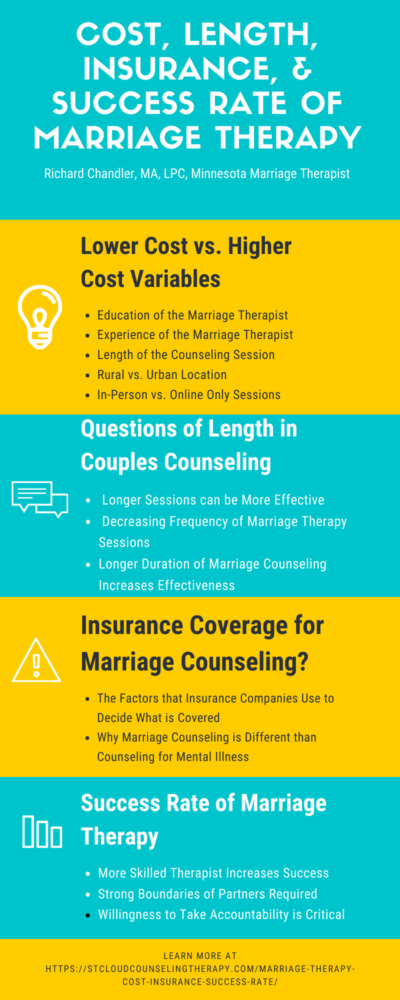
MARRIAGE THERAPY: COST, LENGTH & INSURANCE COVERAGE?
© 2026 St. Cloud Counseling Therapy
As a teletherapy and online marriage therapist and couples’ counselor who specializes in marriage therapy, questions about the cost, frequency, number of sessions, insurance coverage are common. People want to know these factors so they may be confident about beginning marriage counseling.
Although the most accurate answer to all of these questions is, “it varies,” the following information may be helpful if you, or a couple that you know, are considering marriage therapy.
What is the Cost of Couples Counseling?
The cost of marriage therapy varies based on therapist education, experience, and location. A low of $60 and a high of $220 is typical. My rate for Elk River, St. Cloud, and online in MN is $115 - $175, based on client income.
Most marriage counselors charge by the session, with payment due at its conclusion. Acceptable forms of payment for most marriage counseling professionals include credit card, check, and cash.
Typically, the cost of a session involving two people is the same rate as for an individual session. But this is not always the case.

Sliding Fee Schedule
Based on Combined Household Income, before Taxes
Under $100,000 = $115.00
$100,000 - $119,999 = $135.00
$120,000 - $139,999 = $155.00
$140,000 + = $175.00
A More Extended Session-Length May Increase the Cost of Each Session
Most psychotherapists schedule on the hour. Insurance companies generally only pay for 45-minute or 50-minute sessions. Because most therapists work with insurance companies, scheduling appointments an hour apart is typical. But with two people in the room, rather than just one, it often takes longer to do productive work within the session than it does with individual therapy. It frequently takes more time due to bickering and getting past feeling defensive when a husband or wife has been critical of their partner.
Like me, many experienced marriage counselors find that scheduling on-the-hour is not as effective when doing couples counseling.
I schedule both couples and individual clients every 1.5 hours, so they receive a full hour of therapy. If it goes a little past an hour, I don't charge extra.

The Education of the Marriage Therapist May Impact the Cost of Sessions
Most states have as many as six mental health licenses. All of those licenses in Minnesota and most other USA states permit the psychotherapist to practice marriage therapy.
The underlying Master’s degree level training needed to earn a “Marriage and Family Therapy License (LMFT)” is considerably more extensive and focused on couples than the coursework preparation for the other mental health licenses. I had the underlying courses to obtain both the LMFT license as well as a Licensed Professional Clinical Counselor license (LPCC).
My primary psychotherapeutic work is devoted to helping committed couples. I elected to get a Licensed Professional Counselor (LPC) license because I did not want to diagnose clients with mental illnesses to help them with their careers, relationships, and marriages. I also wanted a higher degree of confidentiality for my clients than is possible when therapists are required to upload their client’s confidential information, including each session’s treatment notes, to insurance company data banks.
Because insurance companies and governmental agencies do not typically work with LPC’s, it was the ideal license for me, despite having the training for obtaining a Licensed Marriage and Family Therapy license.
Lower Cost Therapy is Often Due to Counselor Inexperience
Like many people new in their business or profession, less experienced people often charge less than those with years of experience. New practitioners need to make a start, and one way to appeal to potential clients is to offer services well below market value. When you see low fees for marriage therapy, well below $100 per session, practitioner inexperience may be the primary reason.
Specialization in Marriage Therapy Can Justify a Higher Session Fee
Specialists in many fields command higher fees than generalists. Therapists who do not specialize may work with a wide age range in clients, from children to people experiencing geriatric challenges. Another common way to be a psychology generalist is to work with a wide variety of mental health challenges.
As a specialist in couples counseling and marriage therapy, I have been able to gain greater insight into how to work constructively with couples with significant challenges to remaining romantic partners. Infidelity, anger, low trust, parenting disagreement, and conflict with in-laws and relatives are just a few of the complex issues faced by couples in distress. Had I not focused on marriage therapy, I would not have the experience to be as effective. Specialization in marriage counseling is a reasonable factor in commanding a higher fee for psychotherapists.

Online vs. In-person Marriage Counseling Can Impact the Pricing of Marriage Counseling
There has been a significant rise in online marriage therapy as an option. Doing both telephone and video-based marriage therapy versus in-person couples counseling has given me the experience to know the advantages and disadvantages of both.
The nuances, body language, and the ability for couples to interact directly with each other contribute significantly to couples counseling’s effectiveness and progress. Online therapy that replicates in-person counseling is on par with in-person, as long as the internet connection is good and the lighting and sound are adaquate. In our practice, we have invested to have professional quality sound, lighting and camera functions so you will be able to hear and us as if we are in the same room together.
Larger national companies are now doing couples counseling. They recruit practitioners who do not wish to have the expense of renting a professional office or the cost and work involved to attract their clients directly. Consequently, those online practitioners earn significantly less than they might receive if they had independent in-person practices. Because those corporate firms pay substantially less for their counselors, and since they do not have the expense of renting physical office space, they can be lower cost.

What Might Be the Financial Cost of not Seeking Professional Marriage Counseling?
The following list provides a few of the many potential financial costs of not beginning marriage therapy:
How Long Does Marriage Therapy Take?
Typically session length for couples' counseling is 1-hour to 1.5 hours, frequency is weekly to monthly, and the overall number of sessions is 4 - 10, based on my experience as a Minnesota Licenced Professional Counselor specializing in Marriage Therapy. Along with cost, time factors may weigh into your decision to enter into relationship counseling.

How Long Does Each Session Last?
The most common length of each marriage counseling session in the United States is about 50 minutes. Most psychotherapists schedule on the hour, leaving only 10 minutes to jot down a few notes and take a restroom break. It may be closer to 45 minutes if the marriage counselor is also responsible for scheduling the next appointment and transacting the payment for the session.
A minority of marriage therapists provide their clients with a full hour of therapy by scheduling every hour and 15 minutes. Doing so is a more honest representation of therapy time than stating that sessions are an hour in length when, in fact, they are scheduled on the hour, allowing for only 50 minutes.
An even smaller percentage of couples counselors plan client sessions at intervals of 1.5 hours, allowing sessions to run a little over an hour when helpful.
All of my sessions, with individuals and couples, are scheduled every hour and a half. I have the flexibility to continue the session, when helpful, rather than having to abruptly cut the session off.

What is a typical frequency of sessions in Couples’ Counseling?
Every other week is a standard frequency in marriage therapy. It allows couples enough time to incorporate what they learn in counseling sessions into their routines and communication with each other. This frequency also helps mates keep forward momentum. When there is too much time between sessions, it is easy for couples to fall back into their old patterns.
In my practice, I find that with couples whose marriage is on the verge of suddenly ending, as can be the case with infidelity, angry, aggressive outbursts, or severe threats of divorce, it is best to see the couple weekly until they stabilize. Once there is less likelihood of a sudden exit by one of the partners, an every-other-week schedule will follow the initial weekly sessions.
As partners can incorporate what they learn in marriage therapy into their daily lives, it is usual for them to get along much better. Therefore, the frequency of sessions may be backed down. In my practice, I encourage every three weeks for a few sessions, then monthly for some time, so improvements continue, and old patterns do not re-emerge. Another three or four monthly sessions could be ideal before ending the marriage counseling.
While the time frames outlined above are typical, the frequency of sessions is impacted by unpredictable schedules due to the health of the couple and their kids, babysitter, and daycare complications, holidays, changing work schedules, and a great many other unpredictable factors.

How Many Sessions is Common with Marriage Counseling?
The number of marriage therapy sessions that couples complete before concluding varies widely, ranging from one to as many as 20 sessions. Knowing the average number of sessions is not necessarily helpful, because couples often end their couples counseling sessions prematurely for a variety of reasons, including:
Financial stress. They are getting along better, and one or the other declares it “good enough.” The pain of not getting along is less than their perceived pain of paying for marriage counseling.
One of them has observed that his or her partner hasn’t put marriage therapy suggestions into action and concluded that additional sessions are a waste of time and money.
On the other hand, a good many couples are committed to healing their relationship and stay with counseling until it concludes by graduating from marriage therapy. The couple now has the confidence that they have learned the tools and acquired the skills to be able to continue being happy together without the professional facilitation of a marriage therapist.

Does Insurance Cover Marriage Therapy?
No. Trouble in your relationship is not a diagnosable mental illness. Insurance, including government coverage, only covers treatment for individuals with diagnosed mental illnesses.
Mental Illness is paid like a physical illness
Here is what the difference is: By law, mental illnesses are now on par with physical diseases. What makes a psychological issue eligible for payment under insurance and government programs is that it is diagnosable as a mental illness and treatable using either psychotherapy, medications, or both.
For insurance to pay, the psychotherapist must treat your diagnosed mental illness directly, as a medical condition. This is very different work than the process of helping a couple communicate better or to heal their relationship from infidelity.

Would Insurance Cover Marriage Therapy if a Diagnosed Mental Illness Impacted Our Marriage?
Although, in some cases, a primary contributing factor to not getting along could be a diagnosable mental illness, it rarer than not. If that would be the case, after diagnosing you or your partner and beginning individual therapy, the other person could be brought in to the 'individual counseling session' from time-to-time to support the changes the person with the diagnosed mental illness is endeavoring to make.
Bringing a mate into an individual session here and there is not marriage counseling. The psychotherapy's purpose is to understand more deeply what the person in therapy is working on, and their partner's role in helping rather than hindering their progress. Insurance pays for that individual session where a romantic partner is present as it does with any other 'individual session.'

Urban vs. Rural Location of the Therapist Impacts Cost
If most of the practitioners in a locale are towards the low end, or the high end, of the $60 - $220 session rate range for marriage therapy sessions, therapist location is often the primary variable in cost. The costs of living in a city tend to be higher. The salaries and hourly wages for urban residents are also typically higher. In general, smaller town marriage counseling is likely to have the lowest fees. Medium-sized cities tend to have session fees priced in the mid-range. Larger cities often have the highest session fees.

The Risk of Attempting to Pay for Couples Counseling with Insurance
If you call a therapist to inquire about couples' therapy, and that person, or their staff, tells you that your insurance can pay for your couples counseling, your insurance company would falsely believe it is individual counseling as described above.
The only way to have your insurance plan pay for your couples' counseling is to misinform your insurance company. They cannot know the truth about the true nature of the work that you and your partner are doing together, or they would not and could not pay for it.
If a counselor engages in misinforming your insurance company, and your insurer discovers that you have been doing marriage therapy rather than treatment of mental illness as individual therapy, they are likely to deny payment. In that case, you would owe the counselor 's firm.
The unexpected bill could be quite large. You may have had quite a few sessions before your insurance company figures out that the counseling was not treating diagnosed mental illness, and you learn that they had denied the claim.
Even though you must pay on your own, counseling to help your romantic relationship is probably worth it for you and your mate. Marriage counseling is still much less costly than ending your relationship.

